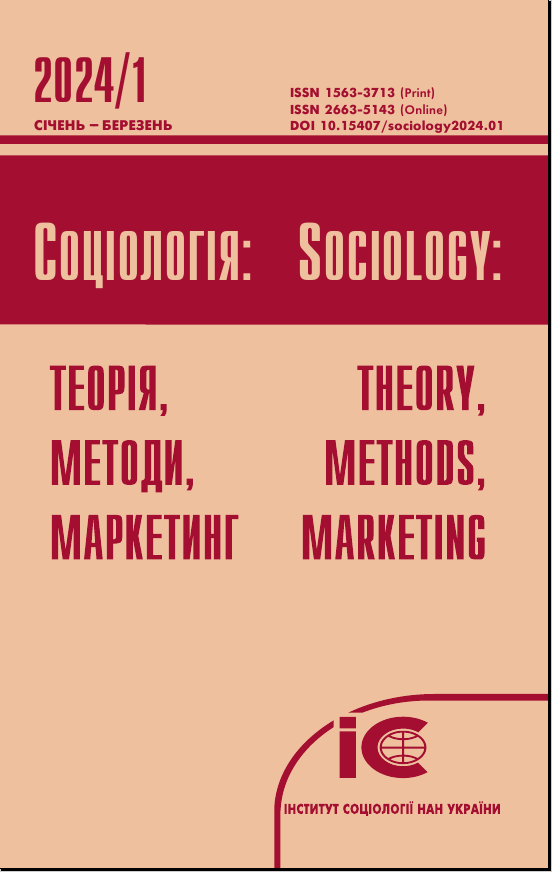Postpositivism in the multiparadigmatic space of social and behavioral sciences
stmm. 2022 (4): 121-142
DOI https://doi.org/10.15407/sociology2022.04.121
VALERII PYLYPENKO, Doctor of Sciences in Sociology, Professor, Principal Research Fellow at the Department of History and Theory of Sociology, Institute of Sociology, National Academy of Sciences of Ukraine (12, Shovkovychna St., Kyiv, 01021)
pilipenko290457@ukr.net
https://orcid.org/0000-0002-9918-6217
The article presents a critical review and reactualization of the results of earlier comparative studies of competing paradigms in social and behavioral sciences and metatheories in marketing research. The results of comparative studies of different paradigms in social and behavioral sciences show a predominant coincidence of paradigmatic dispositions of positivism and postpositivism in many issues of ontology, epistemology, methodology, ethics, and axiology. At the same time, postpositivism is more adaptive under the conditions of paradigmatic competition, more open to borrowing and applying fruitful research practices of competing paradigms.
Keywords: positivism, postpositivism, paradigm, ontology, epistemology, methodology, metatheory
References
Guba, E.G., Lincoln, Y.S. (1994). Competing paradigms in qualitative research. In: N.K. Denzin, Y.S. Lincoln (Eds.), Handbook of qualitative research (pp. 105–117). Thousand Oaks, CA: Sage.
Hunt, S.D. (1984). Should Marketing Adopt Relativism? In: P.F. Anderson, M.J. Ryan (Eds.), AMA Winter Educators’ Conference: Scientific Method in Marketing (pp. 30–34). Chicago: American Marketing.
International Code of Marketing and Social Research Practice (extractions) . (2004). [In Ukrainian]. Public Opinion, 4, 45–48. [= Міжнародний процесуальний кодекс 2021].
Lakatos, I. (1978). Falsification and the Methodology of Scientific Research Programs. In: J.Worral, G.Currie (Eds.), The Methodology of Scientific Research Programs: Imre Lacatos Philosophical Papers (vol. 1, pp. 8–101). Cambridge: Cambridge University Press.
Leong, S.M. (1985). Metatheory and Metamethodology in Marketing: A Lakatosian Reconstruction. Journal of Marketing, 49(4), 23–40. Peter, J.P., Olson, J.C. (1983). Is Science Marketing? Journal of Marketing, 47(11), 111–125.
Reznik, V. (2021). Analysis of research programs: a sociological perspective. [In Ukrainian]. Sociology: theory, methods, marketing, 4, 104–128. DOI: https://doi.org/10.15407/sociology2021.04.104. [= Резнік 2021].
Received 10.08.2022
Postpositivism in the multiparadigmatic space of social and behavioral sciences
stmm. 2022 (4): 121-142
DOI https://doi.org/10.15407/sociology2022.04.121
VALERII PYLYPENKO, Doctor of Sciences in Sociology, Professor, Principal Research Fellow at the Department of History and Theory of Sociology, Institute of Sociology, National Academy of Sciences of Ukraine (12, Shovkovychna St., Kyiv, 01021)
pilipenko290457@ukr.net
https://orcid.org/0000-0002-9918-6217
The article presents a critical review and reactualization of the results of earlier comparative studies of competing paradigms in social and behavioral sciences and metatheories in marketing research. The results of comparative studies of different paradigms in social and behavioral sciences show a predominant coincidence of paradigmatic dispositions of positivism and postpositivism in many issues of ontology, epistemology, methodology, ethics, and axiology. At the same time, postpositivism is more adaptive under the conditions of paradigmatic competition, more open to borrowing and applying fruitful research practices of competing paradigms.
Keywords: positivism, postpositivism, paradigm, ontology, epistemology, methodology, metatheory
References
Guba, E.G., Lincoln, Y.S. (1994). Competing paradigms in qualitative research. In: N.K. Denzin, Y.S. Lincoln (Eds.), Handbook of qualitative research (pp. 105–117). Thousand Oaks, CA: Sage.
Hunt, S.D. (1984). Should Marketing Adopt Relativism? In: P.F. Anderson, M.J. Ryan (Eds.), AMA Winter Educators’ Conference: Scientific Method in Marketing (pp. 30–34). Chicago: American Marketing.
International Code of Marketing and Social Research Practice (extractions) . (2004). [In Ukrainian]. Public Opinion, 4, 45–48. [= Міжнародний процесуальний кодекс 2021].
Lakatos, I. (1978). Falsification and the Methodology of Scientific Research Programs. In: J.Worral, G.Currie (Eds.), The Methodology of Scientific Research Programs: Imre Lacatos Philosophical Papers (vol. 1, pp. 8–101). Cambridge: Cambridge University Press.
Leong, S.M. (1985). Metatheory and Metamethodology in Marketing: A Lakatosian Reconstruction. Journal of Marketing, 49(4), 23–40. Peter, J.P., Olson, J.C. (1983). Is Science Marketing? Journal of Marketing, 47(11), 111–125.
Reznik, V. (2021). Analysis of research programs: a sociological perspective. [In Ukrainian]. Sociology: theory, methods, marketing, 4, 104–128. DOI: https://doi.org/10.15407/sociology2021.04.104. [= Резнік 2021].
Received 10.08.2022
